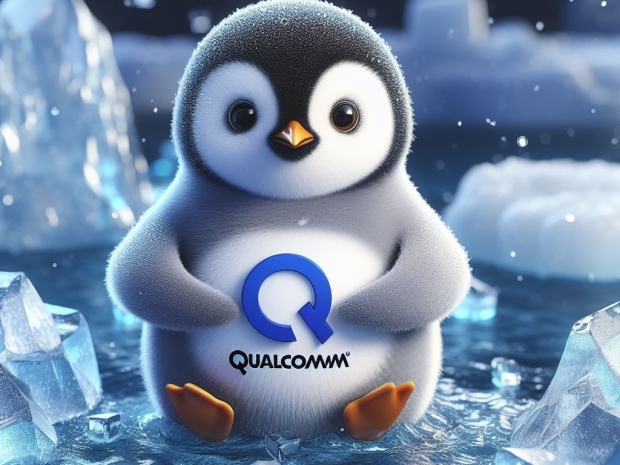.Qualcomm Technologies has added new products for Wi-Fi connectivity and on-device AI and acquired Foundries.io to support developing and updating Linux-based IoT and edge devices. Its new Qualcomm QCC730 Wi-Fi solution and Qualcomm RB3 Gen 2 platform enhance its offerings for enabling on-device AI, high-performance, low-power processing, and connectivity for the latest IoT products and applications.
The QCC730 is a micro-power Wi-Fi system for IoT connectivity, targeting products in battery-powered industrial, commercial, and consumer applications. (Image: Qualcomm)
Its new QCC730 is a micro-power Wi-Fi system for IoT connectivity, which the company states provides up to 88% lower power than previous generations, targeting products in battery-powered industrial, commercial, and consumer applications. The SoC is complemented with an open-source IDE and SDK that supports cloud connectivity offloading for ease of development. Qualcomm states developers can even implement the QCC730 as a high-performance alternative to Bluetooth IoT applications for flexible design and direct cloud connectivity. Other products in its IoT connectivity product family include the QCC711, a tri-core ultra-low power Bluetooth Low Energy SoC, and QCC740, an all-in-one solution supporting Thread, Zigbee, Wi-Fi, and Bluetooth.
The QCC730 enables devices to support TCP/IP networking capabilities while remaining form-factor, completely wireless-constrained, and connected to cloud platforms. Rahul Patel, group general manager of connectivity, broadband and networking at Qualcomm Technologies, Inc., said, “Along with the rest of our IoT connectivity portfolio, this new offering places Qualcomm Technologies at the centre of next-generation battery-powered smart-home, healthcare, gaming and other consumer electronic devices, and reflects our commitment to utilise our decades of R&D to pioneer new user consumer experiences.”
The new Qualcomm RB3 Gen 2 platform is a hardware and software solution designed for IoT and embedded applications, utilising the Qualcomm QCS6490 processor. The company states this new platform offers a combination of high-performance processing, a 10x increase in on-device AI processing, support for quadruple 8MP+ camera sensors, computer vision, and integrated Wi-Fi 6E. RB3 Gen 2 is expected to be used in various products, including robots, drones, industrial handheld devices, industrial and connected cameras, AI edge boxes, intelligent displays, and more. This platform is now available for pre-order in two integrated development kits and supports downloadable software updates to simplify application development, integration, and building proof-of-concepts and prototypes.
The new Qualcomm RB3 Gen 2 platform is a hardware and software solution designed for IoT and embedded applications, utilising the Qualcomm QCS6490 processor. (Image: Qualcomm)
The RB3 Gen 2 is also supported in the recently announced Qualcomm AI Hub, which contains a library of continuously refreshed pre-optimised AI models for better on-device AI performance, lower memory utilisation, and power-optimised operation. This allows for an out-of-the-box optimised experience across various broadly used AI models deployed across IoT and embedded applications. Developers can view a selection of models for RB3 Gen 2 and integrate the optimised AI models into their applications, reducing time-to-market and unlocking the benefits of on-device AI implementations such as immediacy, reliability, privacy, personalisation, and cost savings.
RB3 Gen 2 features support for Qualcomm Linux – a package of OS, software, tools, and documentation precisely designed for Qualcomm Technologies’ IoT platforms. It offers a unified Linux distribution that caters to multiple SoCs, starting with the QCS6490 processor. It features essential components like the Long-Term Support (LTS) kernel for a consistent developer experience. The Qualcomm Linux software stack supports all platform processor cores, subsystems, and components. Qualcomm Linux is currently available for private preview with select collaborators and is planned for wider availability to developers in the coming months.
The company added that Qualcomm Technologies acquired Foundries.io to expand its open-source expertise and speed product commercialisation with Qualcomm Linux. Foundries.io is a provider of an open-source cloud-native platform that abstracts the complexities of developing and updating Linux-based IoT and edge devices.
Qualcomm Technologies also stated it will introduce an industrial-grade platform to address industrial applications' functional safety, environmental, and mechanical handling requirements. This platform will support System Integrity Level certification, vast operating temperature ranges, and industrial module packaging to address deployment requirements in enterprise and industrial environments. This solution will be available in June 2024. It will feature high-performance CPU, GPU, and on-device AI capabilities, advanced safe camera ISP with multi-concurrent camera support, and support for industrial I/O needs.

